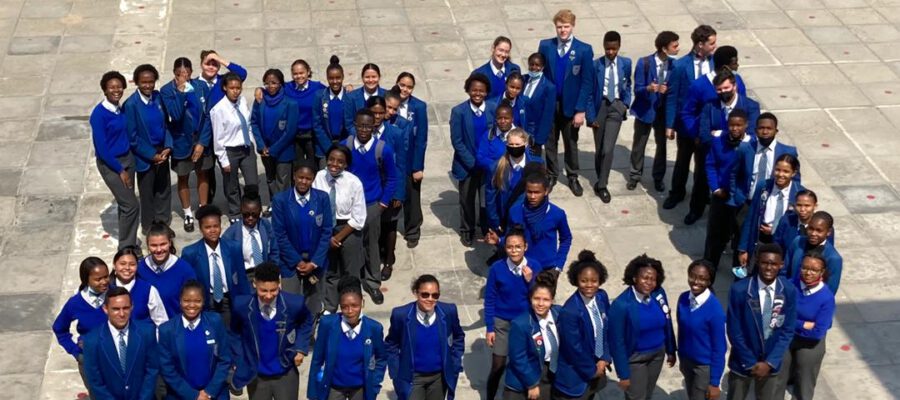(by Katharina Moser) “A noble goal”: The German Association supports schools and enables education
The Sonnenkinderprojekt is celebrating its birthday and can look back on two decades of successful commitment. The German organization supports numerous Namibian schools and provides schoolchildren with everything they need for their education.
When a willingness to help lasts for many years, it comes from the heart. The Sonnenkinderprojekt, which has just celebrated its 20th anniversary, is living proof of this. The association is dedicated to supporting education in Namibia and, over the last two decades, has established 1,000 partnerships with schoolchildren, 900 successful graduations and a volume of aid amounting to a good 1.1 million euros – a record that indicates that the Sonnenkinder project is nothing other than a great success story.
The project began under Chairman Arthur Rohlfing after a private trip to Namibia in 2003, during which the founders of the project became aware of the sometimes desolate conditions of an elementary school in Swakopmund. This inspired the current project managers to generate support for the school. “In 2004, the volume of aid amounted to 7,500 euros. Today, the amounts per year have reached six figures. Back then it was one class that was supported, today several schools. They are all offered help to help themselves. Continuously and comprehensibly monitored on site,” says Arthur Rohlfing. All this with the aim of providing children with a good education and vocational training and thus opening up a life of free self-determination for them.
The Sonnenkinderprojekt was founded in October 2003 in Neubruchhausen by the founding members Arthur Rohlfing, Bärbel Oltmann, Elvira Lange, Günter Sakulowski and Karin Kastner-Sakulowski, Lisa Schmidt, Werner Schmidtsdorff, Edda Koopmann, Maren Pjede, Wolfgang Weise and Dieter and Susanne Schulz. The first partner school was the Namib Primary School in Swakopmund. The following year, Namib High School was accepted as the second partner school, where the project has invested over EUR 370,000 to date, including for textbooks, the installation of a media center and a roof renovation, also with financial support from the Cultural Preservation Fund.
The partner schools Augeikhas Primary School in Windhoek and Rehoboth Primary School followed in 2007 and Swakopmund Primary School in 2012, where the Sonnenkinderprojekt completely renovated five roofs. This was followed in 2013 by M&K Gertze High School in Rehoboth, Khomas Primary School and Gammams Primary School in Windhoek as well as Okatale Primary School, where the Sonnenkinderprojekt installed the first photovoltaic system in 2014.
Over the years, the Sonnenkinderprojekt has arranged school partnerships and sponsored children, built classrooms, renovated buildings, installed equipment and provided textbooks and school uniforms – with the aim of supporting Namibia in education. The financial investment that flows into the schools with the support of other German institutions often amounts to six-figure sums. The organization also facilitates exchanges and internships in Germany and launched a program for ‘climate scouts’.
According to Rohlfing, the financial support and voluntary work is no longer only provided by the members, but also with the help of the Foreign Ministry, the Federal Ministry for Economic Cooperation and Development, the Bingo Environmental Foundation, Lions, Rotarians, companies, local associations and countless “people like you and me”.
The commitment of the German association to Namibia, which also sees itself as a means of international understanding, has not gone unnoticed in Namibia and internationally. On the occasion of the 20th anniversary, the Namibian Ambassador to Germany, Martin Andjaba, said: “20 years of Sonnenkinderprojekt Namibia e.V. is another milestone that the Embassy of the Republic of Namibia in Berlin takes note of with great pleasure, because it is a testament to success, commitment and, above all, perseverance.” As individuals and as a community, it is our duty to equip children with the education and values they need to master life. “Therefore, the focus of the activities of the Sonnenkinderprojekt Namibia e.V. on education is very welcome, as it is the key to development. It is an extremely noble goal to give every child and young person in Namibia a realistic and fair chance of a good education, especially children whose families are struggling with their financial situation. In this sense, the spiritual but also financial value of their work cannot be overestimated,” says Andjaba. The list of schools supported by the Sonnenkinderprojekt is impressive – “above all, their commitment is reliable and sustainable”. The project attaches great importance to ensuring the renovation and maintenance of the selected educational institutions and provides green energy through solar systems not only for them, but also for individual households. Non-governmental organizations such as the Sonnenkinderprojekt are important partners of the Namibian government in providing children with an education.
However, the project managers are by no means resting on their laurels and already have big plans for 2024: According to their own information, a building for two new classrooms is to be constructed at Khomasdal Primary School in Windhoek with an investment of around EUR 30,000. The kitchen at Gammams Primary School in Windhoek is to be completely renovated at a cost of around EUR 12,000. In addition, a roof at Swakopmund Primary School in Swakopmund is leaking and urgently needs to be renovated. The Coastal High School in Swakopmund is to be completely converted to solar energy. “The school is to serve as a pilot project for all other partner schools of the Sonnenkinderprojekt,” says the Sonnenkinderprojekt. Students from Coastal and Namib High School are to be instructed in the installation and operation of solar systems. “A qualified engineer has already been found for this task.” The students will also have the opportunity to complete an internship lasting several weeks in Germany. In the long term, apprenticeships are also to be offered in Lower Saxony. “The financial framework is currently being determined. Leading companies from Lower Saxony have already pledged their support.” Given the success of the project over the last 20 years, this is certainly something to look forward to with confidence.
